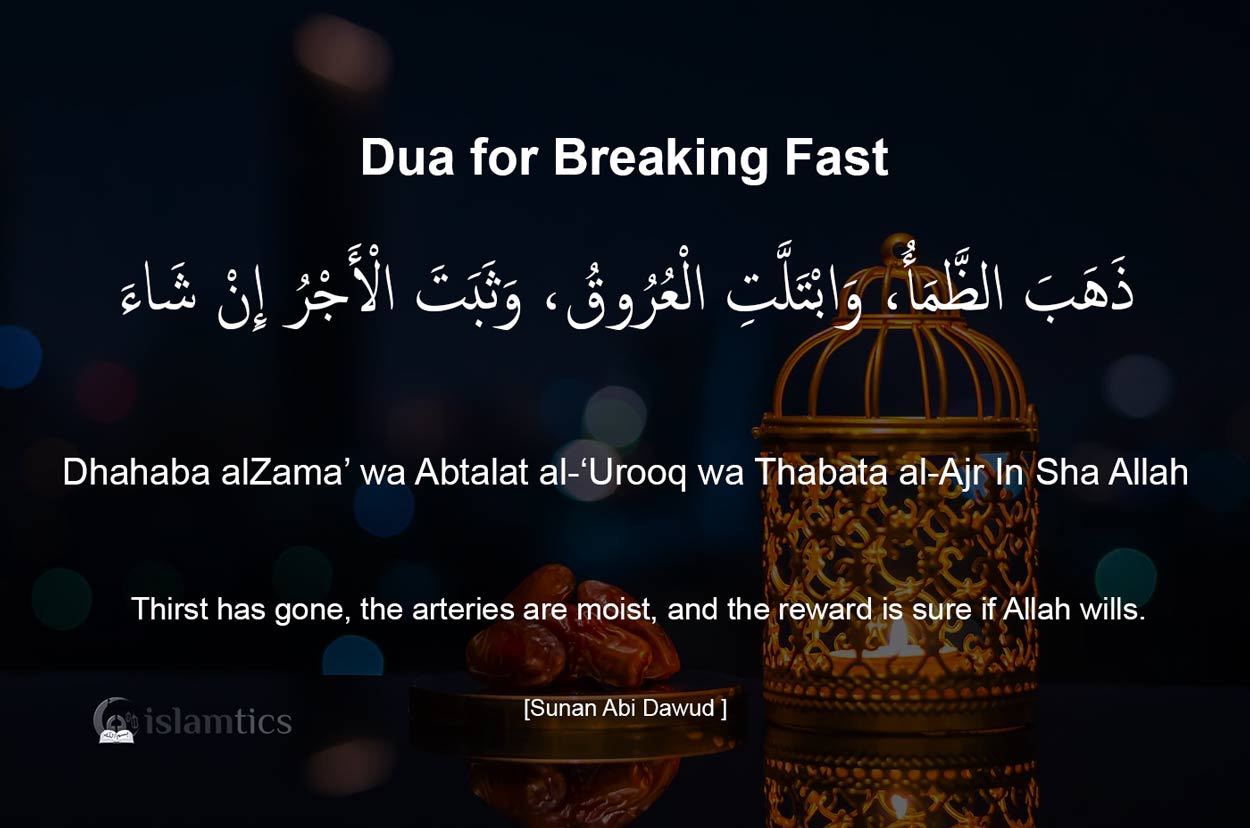Dua For Breaking Fast: A Guide For Ramadan & Beyond
What words can truly capture the profound gratitude and spiritual connection felt at the breaking of a fast? The act of breaking fast, Iftar, is more than just physical sustenance; its a spiritual reawakening, a moment of deep connection with the divine.
From the quiet contemplation of the day's abstinence to the shared joy of the evening meal, Iftar is a time of reflection, gratitude, and supplication. Its a practice woven into the fabric of Islamic tradition, a testament to faith, patience, and reliance on God's provision. The Prophet Muhammad (peace be upon him) emphasized the importance of supplication during this sacred time, teaching specific duas to be recited before and after breaking the fast. These prayers, rich in meaning and tradition, add another layer of depth to the spiritual experience of Ramadan and voluntary fasts throughout the year.
| Aspect | Details |
|---|---|
| Iftar Dua (Most Common) | (Allahumma laka sumtu wa 'ala rizqika aftartu) O Allah, for You I have fasted, and upon Your provision I have broken my fast. |
| Alternative Dua | (Allahumma inni laka sumtu wa bika amantu wa 'alayka tawakkaltu wa 'ala rizqika aftartu) O Allah, for You I fasted, and in You I believe, and upon You I put my trust, and with Your sustenance I break my fast. |
| Time of Recitation | Immediately before breaking the fast, preferably with dates and water. |
| Significance | Expressing gratitude to Allah for sustenance, acknowledging reliance on His provision, seeking His blessings. |
| Authenticity | Narrated by Abu Dawud (2358) and other hadith collections. |
| Reference | Sunnah.com (Abu Dawud 2358) |
The most widely recognized dua for breaking the fast is "Allahumma laka sumtu wa 'ala rizqika aftartu," meaning, "O Allah, for You I have fasted, and upon Your provision I have broken my fast." This concise yet powerful supplication encapsulates the essence of fasting abstaining for the sake of God and acknowledging that all sustenance ultimately comes from Him. Its a simple expression of gratitude and reliance, a recognition of the divine hand in providing for our needs.
Another dua often recited is "Allahumma inni laka sumtu wa bika amantu wa 'alayka tawakkaltu wa 'ala rizqika aftartu," translating to "O Allah, for You I have fasted, and in You I believe, and upon You I put my trust, and with Your sustenance I break my fast. This expanded version adds layers of faith and trust, emphasizing complete dependence on God. Its a declaration of belief, a reaffirmation of faith, and an acknowledgment of Gods ultimate power and provision. Both duas are considered authentic, having been narrated in various hadith collections, including Abu Dawud.
The timing of the dua is also significant. Its recommended to recite the dua just before breaking the fast, ideally while holding dates or a glass of water, ready to consume them as the sun sets. This practice reinforces the connection between the physical act of breaking the fast and the spiritual act of supplication. Its a moment of both physical and spiritual nourishment.
The significance of these duas extends beyond simply uttering words. They are a powerful means of connecting with God, expressing gratitude, and seeking His blessings. They serve as a reminder that fasting is not merely about abstaining from food and drink but about cultivating spiritual discipline, increasing awareness of God's presence, and strengthening ones relationship with Him. The act of supplication itself is a form of worship, and reciting these duas during Iftar adds a profound spiritual dimension to the breaking of the fast.
Beyond these prescribed duas, the time of Iftar is also an opportune moment for personal supplications. The Prophet Muhammad (peace be upon him) said, The supplication of the fasting person at the time of breaking fast is not rejected (Sunan Ibn Majah 1753). This hadith underscores the special status of duas made at Iftar. Its a time when the heart is humbled, the spirit is softened, and the connection with God is heightened. Therefore, Muslims are encouraged to use this time to make sincere duas for anything they desire, whether it's forgiveness, health, ease, success, or guidance.
The practice of reciting duas during Iftar is not limited to Ramadan. While Ramadan holds a special significance, Muslims are encouraged to continue this practice during voluntary fasts throughout the year. This consistent act of supplication helps maintain a strong connection with God and cultivates a spirit of gratitude and reliance on His provision. Whether fasting in Ramadan or on other occasions, making dua before breaking the fast transforms a simple act of consuming food into a powerful act of worship, strengthening one's faith and deepening one's relationship with the Divine.
Sharing Iftar with family and friends adds another layer of blessings. Communal Iftars are a cherished tradition, fostering a sense of unity and togetherness. The shared experience of breaking the fast reinforces the bonds of community and provides an opportunity to strengthen relationships while remembering God's blessings. Reciting duas together amplifies the spiritual atmosphere and adds to the collective sense of gratitude and devotion.
Fasting is a deeply personal and profoundly spiritual journey. The duas recited at Iftar serve as guideposts on this journey, reminding us of our purpose, strengthening our resolve, and deepening our connection with God. They are not mere words but expressions of the heart, reflecting the essence of fasting humility, gratitude, and complete reliance on the Divine.
The practice of reciting duas at Iftar is a testament to the beauty and depth of Islamic tradition. It transforms the simple act of breaking a fast into a profound spiritual experience, enriching our lives and bringing us closer to God. The words of supplication, whispered with sincerity and humility, echo the profound gratitude and deep connection felt at this sacred time. They are a reminder of the true essence of fasting not just abstaining from physical sustenance, but nourishing the soul and strengthening the spirit through connection with the Divine.


